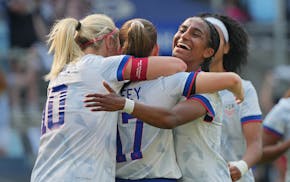Before examining what may happen with the Timberwolves offseason, let's set a few assumed premises for how the Wolves will operate.
First, when the Wolves traded Karl-Anthony Towns, and the contract that pays him $220 million through the 2028 season, it was a signal that they weren't going to be a team over the dreaded NBA second apron for too long. They were in the second apron this season as lucrative extensions for Anthony Edwards and Jaden McDaniels entered their first years.
The second apron is a financial threshold above the NBA's luxury tax for exceeding the salary cap at which an additional layer of penalties goes into effect. It began in the 2024 offseason.
The Wolves face high tax rates for being in this area of the luxury tax, but being a second-apron team carries with it punitive roster-building restrictions that teams have come to detest: freezing of draft picks in trades; having future picks fall to the end of the first round; the inability to combine salaries to make trades; the inability to use the midlevel exception in free agency.
All that would be on the table for the Wolves in future years should they remain a second-apron team, and that was a big motivating factor behind trading Towns for Julius Randle, who has a player option next season, and Donte DiVincenzo, who is signed for two more years for a combined $23.5 million.
The next signal the Wolves sent that they wanted to duck under the second apron was Rudy Gobert's extension, which he agreed to opening night of the season. Gobert waived a player option for nearly $47 million for next season in order to sign a three-year, $110 million deal that begins at $35 million next year. That moved saved the team $12 million in space for next season, with the threshold for the second apron set at nearly $207.8 million. At the time, Gobert referenced working with the Wolves and taking less money than he might have earned in an attempt to maintain a competitive roster.
"It's an amazing blessing," Gobert said in October. "At the same time being able to not be too greedy and leave some on the table for our competitiveness as a team. I think it's important."
As for paying the tax, incoming controlling owners Marc Lore and Alex Rodriguez, who aren't doing on-the-record interviews at least until the NBA has officially finalized the sale of the team to them from Glen Taylor, have previously said they have money to spend to invest in the team. Taylor also owns the Minnesota Star Tribune.
"I've got literally hundreds of millions of dollars in the bank, ready to invest in the Wolves and bring home a championship," Lore told the Star Tribune in March 2024. "We're never in a better spot."
So, operating on the premises that the Wolves will be a first-apron team and that Lore and Rodriguez are willing to pay the necessary luxury tax for them to be so, here's a look at what might happen this offseason for the Wolves.
The Randle and Reid options
Randle, 30, and Naz Reid, 25, are in different spots relative to their ages and what they are owed on their options (Randle's is $31 million, Reid's is $15 million). ESPN Front Office Insider Bobby Marks said he believes both will opt in. Part of Marks' calculus seemed to be that the number of teams that will have money to sign players past the midlevel exception is low and that that number might be higher next season.
I'm a little skeptical about his claim for Reid opting in, but I can see the case for Randle. He's 30, and while his Western Conference finals wasn't what he or fans envisioned, he played great the first two rounds and found his footing in Minnesota late in the regular season.
He has said many times over that the lifestyle fits him and his family well, and he loves playing for coach Chris Finch. But he might not make $31 million on the open market, and by opting in he could also still sign an extension with the Wolves beyond that. If he's willing to do what Gobert did and give up some money, he could opt out of that option and negotiate a long-term deal at a lower number than $31 million.
But opting in and then extending could be a middle ground for both sides to get what they want in terms of money and financial flexibility for the future in what likely will be the last big chance for Randle to have a big payday in his early 30s.
As for Reid, he indicated at the team's exit interviews that he was likely to decline his option and shoot for a long-term deal.
"I think the work has been put in," Reid said. "Obviously, I've got a long way to go with being only 25, but for sure, I think that's what the future looks like for me."
Reid could also opt in and negotiate a long-term deal on top of it, or opt out and get a long-term deal with the Wolves or elsewhere. The Wolves value Reid highly, and one of the reasons for making the Towns deal was because it made it more likely they could have Reid playing alongside Edwards and his good friend McDaniels for years to come. Reid, last season's Sixth Man of the Year, might want to become a starter, and he views himself as such. Other teams might be in a better position to offer him that should Randle and Gobert both return, but Reid also indicated he might be open again to coming off the bench, especially for another chance to win.
"… If you want to be in a winning position, sometimes you might have to sacrifice," he said. "So I definitely view myself as a starter, but things happen, things change. You never know what's ahead of you until you talk about it and until you go through it."
Again, the lack of teams with money to spend will affect his market if he opts out. Just how much remains to be seen, but Reid is itching for a big payday, whether from the Wolves or elsewhere. If the Wolves want to re-sign him, they have about $27.8 million under the second apron to do so (this is where the Gobert contract is helpful), assuming Randle opts in to his deal and Reid opts out of his. This is also before factoring in that the Wolves have the 17th pick in the draft (slated to make around $4.2 million) and No. 31 (second-round picks aren't subject to a salary slot, but for reference the No. 30 pick is slated to make $2.74 million).
What about NAW?
This is where fans might have to prepare themselves for some heartbreak. Nickeil Alexander-Walker was making $4.3 million this season. He is in line to be a target for teams to spend their midlevel exception, which opens his market to many more teams than Reid or Randle, who will be making or looking to make more than the approximately $14 million midlevel exception. A lot of teams can't really spend above that threshold.
This is where Alexander-Walker's next payday could land. It just doesn't look like the Wolves could afford to pay him around $14 million while staying under the second apron and retaining Randle or Reid. If they lose Randle or Reid, then it would seem retaining Alexander-Walker is on the table. But the Wolves seemingly have young players at guard or wing waiting, such as Terrence Shannon Jr., Jaylen Clark and Rob Dillingham, who could fill his spot in the rotation.
For the future, the Wolves also need to see what they have in their young talent, especially Dillingham, as Mike Conley enters the final year of his contract, when he will turn 38. Free agency can always take unexpected twists and turns, so never say never, but bringing back Alexander-Walker will be tough without re-entering the second apron.
The KD wild card
There's one thing that can upend the Wolves' offseason and the trajectory of this franchise in years to come: The Wolves making another attempt to trade for Phoenix forward Kevin Durant.
The Wolves tried to trade for him at February's trade deadline but came up short. It's likely they will make some calls back to the Suns to see if the interest is there again.
Durant is the favorite player of Edwards, who played with his childhood hero at the Olympics last summer. There seems to be an interest in Durant playing again with Edwards. Durant, who averaged 26.6 points per game on 53% shooting (43% from three-point range) in 2024-25, will turn 37 in September. He will be entering the final year of his contract and will make $54.7 million next season.
To trade for Durant, the Wolves would have to shake up the roster in a big way, and it likely would mean relying on some of the young talent to fill out their depth, if such a move occurs. They have limited draft capital to trade, so they would have to get creative and perhaps even deal some of those young players and current rotation pieces to make the move happen.
That move is hard to predict and would throw everything else I just said above out the window. But such is the NBA offseason.
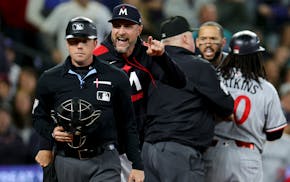
Twins' Correa ejected from on-deck circle, and he's not really sure why
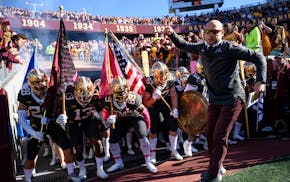
Two offensive tackles, linebacker are first to commit to Gophers in 'Summer Splash' weekend
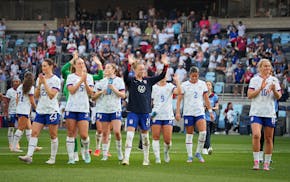
Neal: Girma returns to United States national team and rewards fans with her classiness
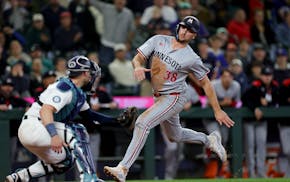
Twins' inability to score in extra innings costly in wild loss at Seattle
